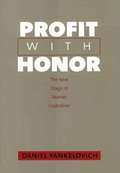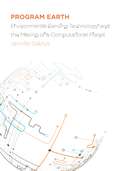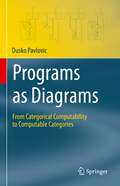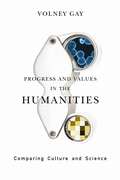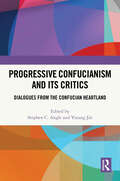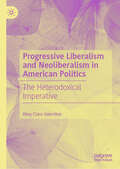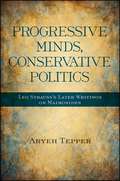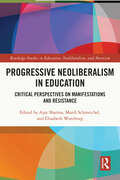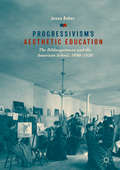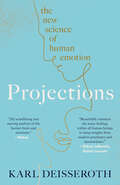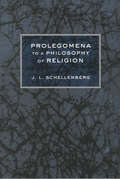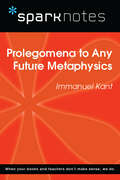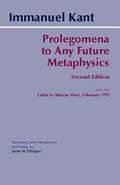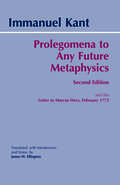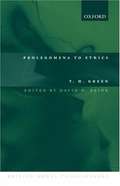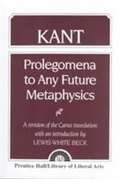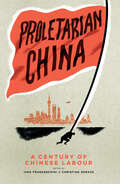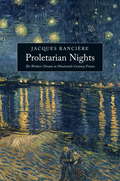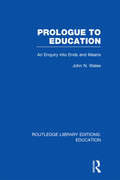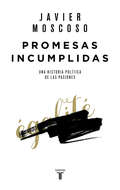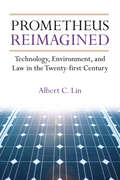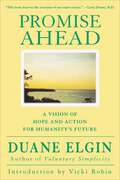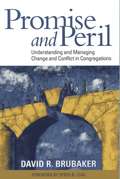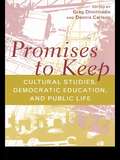- Table View
- List View
Profit with Honor: The New Stage of Market Capitalism
by Daniel YankelovichThis wise and optimistic book examines the rampant scandals that plague American corporations today and shows how companies can reverse the resulting climate of mistrust. By seizing the opportunity to address some of the nation's--and the world's--most serious problems, business can strengthen its reputation for integrity and service and advance to a new stage of ethical legitimacy. Daniel Yankelovich, a social scientist and an experienced member of the corporate boardroom, describes the toxic convergence of cultural and business trends that has led inexorably to corporate scandals. Yet he offers reassurance that opportunity exists for positive change. Creative business leaders can advance market capitalism to its next stage of evolution, building upon business norms that simultaneously emphasize the legitimacy of profit making and the importance of the care that companies give to employees, customers, and the larger society. The book asserts that American culture has abandoned its old tradition of enlightened self-interest, of "doing well by doing good. " A narrow legalism has taken over ("I didn't break the law; therefore I didn't do anything wrong"). Yankelovich argues that attempts to deal with such flawed ethical norms by means of more laws and regulations cannot succeed. He offers a series of case histories to show how and why stewardship ethics can strengthen individuals, corporations, the nation, and the world economy.
Program Earth: Environmental Sensing Technology and the Making of a Computational Planet (Electronic Mediations #49)
by Jennifer GabrysSensors are everywhere. Small, flexible, economical, and computationally powerful, they operate ubiquitously in environments. They compile massive amounts of data, including information about air, water, and climate. Never before has such a volume of environmental data been so broadly collected or so widely available.Grappling with the consequences of wiring our world, Program Earth examines how sensor technologies are programming our environments. As Jennifer Gabrys points out, sensors do not merely record information about an environment. Rather, they generate new environments and environmental relations. At the same time, they give a voice to the entities they monitor: to animals, plants, people, and inanimate objects. This book looks at the ways in which sensors converge with environments to map ecological processes, to track the migration of animals, to check pollutants, to facilitate citizen participation, and to program infrastructure. Through discussing particular instances where sensors are deployed for environmental study and citizen engagement across three areas of environmental sensing, from wild sensing to pollution sensing and urban sensing, Program Earth asks how sensor technologies specifically contribute to new environmental conditions. What are the implications for wiring up environments? How do sensor applications not only program environments, but also program the sorts of citizens and collectives we might become?Program Earth suggests that the sensor-based monitoring of Earth offers the prospect of making new environments not simply as an extension of the human but rather as new &“technogeographies&” that connect technology, nature, and people.
Programs as Diagrams: From Categorical Computability to Computable Categories (Theory and Applications of Computability)
by Dusko PavlovicIt is not always clear what computer programs mean in the various languages in which they can be written, yet a picture can be worth 1000 words, a diagram 1000 instructions. In this unique textbook/reference, programs are drawn as string diagrams in the language of categories, which display a universal syntax of mathematics (Computer scientists use them to analyze the program semantics; programmers to display the syntax of computations). Here, the string-diagrammatic depictions of computations are construed as programs in a single-instruction programming language. Such programs as diagrams show how functions are packed in boxes and tied by strings. Readers familiar with categories will learn about the foundations of computability; readers familiar with computability gain access to category theory. Additionally, readers familiar with both are offered many opportunities to improve the approach. Topics and features: Delivers a ‘crash’ diagram-based course in theory of computationUses single-instruction diagrammatic programming languageOffers a practical introduction into categories and string diagrams as computational toolsReveals how computability is programmability, rather than an ‘ether’ permeating computers Provides a categorical model of intensional computation is unique up to isomorphismServes as a stepping stone into research of computable categories In addition to its early chapters introducing computability for beginners, this flexible textbook/resource also contains both middle chapters that expand for suitability to a graduate course as well as final chapters opening up new research. Dusko Pavlovic is a professor at the Department of Information and Computer Sciences at the University of Hawaii at Manoa, and by courtesy at the Department of Mathematics and the College of Engineering. He completed this book as an Excellence Professor at Radboud University in Nijmegen, The Netherlands.
Progress and Values in the Humanities: Comparing Culture and Science
by Volney GayMoney and support tend to flow in the direction of economics, science, and other academic departments that demonstrate measurable "progress." The humanities, on the other hand, offer more abstract and uncertain outcomes. A humanist's objects of study are more obscure in certain ways than pathogens and cells. Consequently, it seems as if the humanities never truly progress. Is this a fair assessment?By comparing objects of science, such as the brain, the galaxy, the amoeba, and the quark, with objects of humanistic inquiry, such as the poem, the photograph, the belief, and the philosophical concept, Volney Gay reestablishes a fundamental distinction between science and the humanities. He frees the latter from its pursuit of material-based progress and restores its disciplines to a place of privilege and respect. Using the metaphor of magnification, Gay shows that, while we can investigate natural objects to the limits of imaging capacity, magnifying cultural objects dissolves them into noise. In other words, cultural objects can be studied only within their contexts and through the prism of metaphor and narrative. Gathering examples from literature, art, film, philosophy, religion, science, and psychoanalysis, Gay builds a new justification for the humanities. By revealing the unseen and making abstract ideas tangible, the arts create meaningful wholes, which itself is a form of progress.
Progressive Confucianism and its Critics: Dialogues from the Confucian Heartland
by Stephen C. Angle Yutang JinIn the spring of 2017, US-based Confucian philosopher Stephen C. Angle took part in a series of dialogues with Chinese Confucians in Beijing. The dialogues engage with topics like the relation between Confucianism and modernity; whether Confucianism should be understood as philosophy, religion, or chief ingredient in a distinctively Chinese culture; the status of pivotal modern Confucians like Kang Youwei and Mou Zongsan; and more generally, the prospects for what Angle calls “Progressive Confucianism.” The present book offers translations of those dialogues into English, together with epilogues by the two editors reflecting on what the dialogues tell us about the contemporary prospects for Confucianism.
Progressive Liberalism and Neoliberalism in American Politics: The Heterodoxical Imperative
by Riley Clare ValentineThis book examines twentieth and twenty-first-century American political discourse through the framework of progressive liberalism and neoliberalism. Progressive liberalism and neoliberalism as forms of normative reason redefine specific political concepts, which are central to American liberalism—equality, liberty, the role of the state, and the pursuit of happiness. Language is how political reason and the norms accompanying it are expressed. The text moves through Presidents Franklin Delano Roosevelt to Barack Obama, exploring shifts in language and interpretations of political concepts through progressive liberal and neoliberal forms of normative reason. A tension emerges between progressive liberalism and neoliberalism, and a heterodoxy emerges. The heterodoxy we find ourselves in continues the problem that is foundational to American liberalism itself—liberalism is inherently a theory and discourse of rights, not of need. Because of this, no form of liberalism can appropriately respond to human needs from a standpoint that is not informed by having a right to or a right from.
Progressive Minds, Conservative Politics: Leo Strauss's Later Writings on Maimonides (SUNY series in the Thought and Legacy of Leo Strauss)
by Aryeh TepperLeo Strauss (1899–1973), one of the preeminent political philosophers of the twentieth century, was an astute interpreter of Maimonides's medieval masterpiece, The Guide of the Perplexed. In Progressive Minds, Conservative Politics, Aryeh Tepper overturns the conventional view of Strauss's interpretation and of Strauss's own mature thought. According to the scholarly consensus, Strauss traced the well-known contradictions in the Guide to the fundamental tension in Maimonides's mind between reason and revelation, going so far as to suggest that while the Jewish philosopher's overt position was religiously pious (i.e., on the side of "Jerusalem"), secretly he was on the side of reason, or "Athens." In Tepper's analysis, Strauss's judgments emerge as much more complex than this and also more open to revision. In his later writings, Tepper shows, Strauss pointed to contradictions in Maimonides's thought not only between but also within both "Jerusalem" and "Athens." Moreover, Strauss identified, and identified himself with, an esoteric Maimonidean teaching on progress: progress within the Bible, beyond the Bible, and even beyond the rabbinic sages. Politically a conservative thinker, Strauss, like Maimonides, located man's deepest satisfaction in progressing in the discernment of the truth. In the fullness of his career, Strauss thus pointed to a third way beyond the modern alternatives of conservatism and progressivism.
Progressive Neoliberalism in Education: Critical Perspectives on Manifestations and Resistance (Routledge Studies in Education, Neoliberalism, and Marxism)
by Ajay SharmaThis volume makes the novel contribution of applying Nancy Fraser’s concept of progressive neoliberalism to education in order to illustrate how social justice efforts have been co-opted by neoliberal forces. As well as recognising the lack of consensus surrounding the very nature of Fraser’s concept of progressive neoliberalism, the book delivers a diversity of perspectives and methodological orientations that offer critical and nuanced examination of the diverse ways in which progressive neoliberalism has shaped education in North America. Documenting manifestations of progressive neoliberalism in areas including anti-racist education, teacher education, STEM, and assessment, the volume uses qualitative empirical research and critical discourse analysis to identify emerging tools and strategies to disentangle the progressive aims of education from neoliberal agendas. Offering a rarely nuanced treatment of the phenomenon of neoliberalism, this text will benefit scholars, academics, and students in the fields of education policy and politics, the sociology of education, and the philosophy of education more broadly. Those involved with the theory of education and multicultural education in general will also benefit from this volume.
Progressivism's Aesthetic Education: The Bildungsroman and the American School, 1890–1920
by Jesse RaberDuring the Progressive Era in the United States, as teaching became professionalized and compulsory attendance laws were passed, the public school emerged as a cultural authority. What did accepting this authority mean for Americans’ conception of self-government and their freedom of thought? And what did it mean for the role of artists and intellectuals within democratic society? Jesse Raber argues that the bildungsroman negotiated this tension between democratic autonomy and cultural authority, reprising an old role for the genre in a new social and intellectual context. Considering novels by Abraham Cahan, Willa Cather, and Charlotte Perkins Gilman alongside the educational thought of John Dewey, the Montessorians, the American Herbartians, and the social efficiency educators, Raber traces the development of an aesthetics of social action. Richly sourced and vividly narrated, this book is a creative intervention in the fields of literary criticism, pragmatic philosophy, aesthetic theory, and the history of education.
Projections: A Story of Human Emotions
by Karl DeisserothA groundbreaking tour of the human mind that illuminates the biological nature of our inner worlds and emotions, through gripping, moving—and, at times, harrowing—clinical stories&“Poetic, mind-stretching, and through it all, deeply human.&”—Daniel Levitin, New York Times bestselling author of The Organized MindKarl Deisseroth has spent his life pursuing truths about the human mind, both as a renowned clinical psychiatrist and as a researcher creating and developing the revolutionary field of optogenetics, which uses light to help decipher the brain&’s workings. In Projections, he combines his knowledge of the brain&’s inner circuitry with a deep empathy for his patients to examine what mental illness reveals about the human mind and the origin of human feelings—how the broken can illuminate the unbroken.Through cutting-edge research and gripping case studies from Deisseroth&’s own patients, Projections tells a larger story about the material origins of human emotion, bridging the gap between the ancient circuits of our brain and the poignant moments of suffering in our daily lives. The stories of Deisseroth&’s patients are rich with humanity and shine an unprecedented light on the self—and the ways in which it can break down. A young woman with an eating disorder reveals how the mind can rebel against the brain&’s most primitive drives of hunger and thirst; an older man, smothered into silence by depression and dementia, shows how humans evolved to feel not only joy but also its absence; and a lonely Uighur woman far from her homeland teaches both the importance—and challenges—of deep social bonds.Illuminating, literary, and essential, Projections is a revelatory, immensely powerful work. It transforms our understanding not only of the brain but of ourselves as social beings—giving vivid illustrations through science and resonant human stories of our yearning for connection and meaning.
Prolegomena To A Philosophy Of Religion
by J. L. SchellenbergThere is no attempt here to lay down as inviolable or to legislate certain ways of looking at things or ways of proceeding for philosophers of religion, only proposals for how to deal with a range of basic issues-proposals that I hope will ignite much fruitful discussion and which, in any case, I shall take as a basis for my own ongoing work in the field. -from the Preface Providing an original and systematic treatment of foundational issues in philosophy of religion, J. L. Schellenberg's new book addresses the structure of religious and irreligious belief, the varieties of religious skepticism, and the nature of religion itself. From the author's searching analysis of faith emerges a novel understanding of propositional faith as requiring the absence of belief. Schellenberg asks what the aims of the field should be, setting out a series of principles for carrying out some of the most important of these aims. His account of justification considers not only belief but also other responses to religious claims and distinguishes the justification of responses, propositions, and persons. Throughout Prolegomena to a Philosophy of Religion, Schellenberg is laying the groundwork for an elaboration of his own vision while at the same time suggesting how philosophers might rethink assumptions guiding most of today's work in analytic philosophy of religion.
Prolegomena to Any Future Metaphysics
by Gary HatfieldThis new, revised edition of Kant's Prolegomena, the best introduction to the theoretical side of his philosophy, presents his thought clearly through careful attention to his original language. Also included are selections from the Critique of Pure Reason, which fill out and explicate some of Kant's central arguments (including famous sections of the Schematism and Analogies), and in which Kant himself explains his special terminology. The first reviews of the Critique, to which Kant responded in the Prolegomena, are included in this revised edition. First Edition Hb (1997): 0-521-57345-9 First Edition Pb (1997): 0-521-57542-7
Prolegomena to Any Future Metaphysics (SparkNotes Philosophy Guide)
by SparkNotesProlegomena to Any Future Metaphysics (SparkNotes Philosophy Guide) Making the reading experience fun! SparkNotes Philosophy Guides are one-stop guides to the great works of philosophy–masterpieces that stand at the foundations of Western thought. Inside each Philosophy Guide you&’ll find insightful overviews of great philosophical works of the Western world.
Prolegomena to Any Future Metaphysics that Will Be Able to Come Forward as Science (Second Edition)
by Immanuel Kant Notes By Translator James W. Ellington (IntroThis edition of Prolegomena includes Kants letter of February, 1772 to Marcus Herz, a momentous document in which Kant relates the progress of his thinking and announces that he is now ready to present a critique of pure reason.
Prolegomena to Any Future Metaphysics: and the Letter to Marcus Herz, February 1772
by Immanuel Kant James W. EllingtonThis edition of Prolegomena includes Kant’s letter of February, 1772 to Marcus Herz, a momentous document in which Kant relates the progress of his thinking and announces that he is now ready to present a critique of pure reason.
Prolegomena to Ethics
by David O. Brink T. H. GreenThe new edition provides an introductory essay, a bibliographical essay, and an index. Brink's extended editorial introduction examines the context, themes, and significance of Green's work and will be of special interest to readers working on the history of ethics, ethical theory, political philosophy, and nineteenth century philosophy.
Prolegomena to any Future Metaphysics
by Immanuel Kant Lewis White BeckKant’s Prolegomena -- its full title, in the eighteenth-century manner, is Prolegomena to Any Future Metaphysics Which Will Be Able to Come Forth as Science -- is a classic in metaphysics and the theory of knowledge. It deals with the perennially baffling questions: How do we know? How much can we know? Its answers to these questions are interesting especially now. We live in one of the recurring periods of intellectual and cultural history that are skeptical and impatient of systems of speculative metaphysics, and a distrust of speculation is the leading motif of the Prolegomena. Though Kant's arguments against speculative metaphysics differ from those of our contemporaries, in some of his results he anticipates their negative conclusions. The Prolegomena, however, is not interesting merely as an historical anticipation of recent views; indeed, as such it has been as it were condemned in advance by Kant (Prolegomena, Introduction). Rather, its chief interest to the student of philosophy is probably the way in which it goes beyond and against the views of contemporary positivism. The book is therefore a challenge both to those who think metaphysical knowledge of the ultimate nature of things is possible and to those who regard metaphysics as comprising only pious wishes and rationalizations, “poetry”, "nonsense," and "pseudoproblems." The Prolegomena is, moreover, the best of all introductions to that vast and obscure masterpiece, the Critique of Pure Reason. It is a guide through what Kant himself calls the "thorny paths" of that work. Because of the central position the Critique occupies in philosophy, the Prolegomena thus makes a major contribution to an understanding of the chief problems of general philosophy, metaphysics, theory of knowledge, philosophy of science, and ethics. It has an exemplary lucidity and wit, making it unique among Kant's greater works and uniquely suitable as a textbook of the Kantian philosophy.
Proletarian China: A Century of Chinese Labour
by Ivan Franceschini Christian SoraceA century of complex relations between Communists and workers in ChinaIn 2021, the Chinese Communist Party celebrated a century of existence. Since the Party&’s humble beginnings in the Marxist groups of the Republican era to its current global ambitions, one thing has not changed for China&’s leaders: their claim to represent the vanguard of the Chinese working class. Spanning from the night classes for workers organised by student activists in Beijing in the 1910s to the labour struggles during the 1920s and 1930s; from the turmoil of the Cultural Revolution to the social convulsions of the reform era to China&’s global push today, this book reconstructs the contentious history of labour in China from the early twentieth century to this day (and beyond). This will be achieved through a series of essays penned by scholars in the field of Chinese society, politics, and culture, each one of which will revolve around a specific historical event, in a mosaic of different voices, perspectives, and interpretations of what constituted the experience of being a worker in China in the past century.Contributors: Corey Byrnes, Craig A. Smith, Xu Guoqi, Zhou Ruixue, Lin Chun, Elizabeth J. Perry, Tony Saich, Wang Kan, Gail Hershatter, Apo Leong, S.A. Smith, Alexander F. Day, Yige Dong, Seung-Joon Lee, Lu Yan, Joshua Howard, Bo Ærenlund Sørensen, Brian DeMare, Emily Honig, Po-chien Chen, Yi-hung Liu, Jake Werner, Malcolm Thompson, Robert Cliver, Mark W. Frazier, John Williams, Christian Sorace, Zhu Ruiyi, Ivan Franceschini, Chen Feng, Ben Kindler, Jane Hayward, Tim Wright, Koji Hirata, Jacob Eyferth, Aminda Smith, Fabio Lanza, Ralph Litzinger, J onathan Unger, Covell F. Meyskens, Maggie Clinton, Patricia M. Thornton, Ray Yep, Andrea Piazzaroli Longobardi, Joel Andreas, Matt Galway, Michel Bonnin, A.C. Baecker, Mary Ann O&’Donnell, Tiantian Zheng, Jeanne L. Wilson, Ming-sho Ho, Yueran Zhang, Anita Chan, Sarah Biddulph, Jude Howell, William Hurst, Dorothy J. Solinger, Ching Kwan Lee, Chloé Froissart, Mary Gallagher, Eric Florence, Junxi Qian, Chris King-chi Chan, Elaine Sio-Ieng Hui, Jenny Chan, Eli Friedman, Aaron Halegua, Wanning Sun, Marc Blecher, Huang Yu, Manfred Elfstrom, Darren Byler, Carlos Rojas, Chen Qiufan.
Proletarian Nights
by Jacques RanciereProletarian Nights, previously published in English as Nights of Labor and one of Rancière's most important works, dramatically reinterprets the Revolution of 1830, contending that workers were not rebelling against specific hardships and conditions but against the unyielding predetermination of their lives. Through a study of worker-run newspapers, letters, journals, and worker-poetry, Rancière reveals the contradictory and conflicting stories that challenge the coherence of these statements celebrating labor.This updated edition includes a new preface by the author, revisiting the work twenty years since its first publication in France.From the Trade Paperback edition.
Prologue to Education: An Inquiry into Ends and Means (Routledge Library Editions: Education)
by John N WalesMany people have come to feel that the controversy on education in Britain has got bogged down in political polemics, and that common polarisations between ‘conventional’ and ‘progressive’, ‘selective’ and ‘comprehensive’, ‘elite’ and ‘democratic’ are both unrealistic and damaging. The author believes that a new educational ethic is needed now that former religious sanctions are no longer generally operative. He believes that it is possible to regard the concept of a Rational Good as a basis for educational theory and practice. The book discusses important practical issues in education: liberty and equality, use and abuse of convention, the ethical basis and occasion for coercion, the validity of co-education as an educational principle and the John Wales concludes that the correspondence between the popular extremes of educational views is much more significant than their differences.
Promesas incumplidas: Las fuentes históricas de la indignación
by Javier MoscosoPromesas incumplidas es una historia sobre la ambición, ligada a la promesa igualitaria y al desengaño que marcó el Romanticismo. De la mano de Javier Moscoso, uno de los mejores ensayistas españoles contemporáneos. Ambición, resentimiento, envidia, celos... El Promesas incumplidas explora las emociones más estrechamente relacionadas con la rivalidad, pero también la fraternidad, el patriotismo, la compasión o la amistad. Las fuentes consultadas incluyen tratados de medicina, de filosofía moral y política, así como de lo que hoy denominamos psiquiatría. Junto a estos se han consultado textos biográficos y autobiográficos, así como material iconográfico, fuentes publicadas y manuscritas.
Prometheus Reimagined: Technology, Environment, and Law in the Twenty-first Century
by Albert C. LinTechnologies such as synthetic biology, nanotechnology, artificial intelligence, and geoengineering promise to address many of our most serious problems, yet they also bring environmental and health-related risks and uncertainties. Moreover, they can come to dominate global production systems and markets with very little public input or awareness. Existing governance institutions and processes do not adequately address the risks of new technologies, nor do they give much consideration to the concerns of persons affected by them. Instead of treating technology, health, and the environment as discrete issues, Albert C. Lin argues that laws must acknowledge their fundamental relationship, anticipating both future technological developments and their potential adverse effects. Laws should encourage international cooperation and the development of common global standards, while allowing for flexibility and reassessment.
Promise Ahead: A Vision of Hope and Action for Humanity's Future
by Duane ElginThe sequel to Duane Elgin’s bestselling classic Voluntary Simplicity, which changed the lives of thousands and was called the “bible” of the simplicity movement by the Wall Street Journal, Promise Ahead looks beneath the headlines to reveal the deeper currents now changing our lives. Elgin sees two powerful sets of trends converging in the coming decades. The first set he calls “adversity trends.” These include 1. Global climate changes that threaten our food supply2. Massive human population3. Mass extinction of species4. Rapid depletion of crucial natural resources 5. Civil unrest caused by global poverty. The second set he calls “opportunity trends.” These include1. Recognition of the universe as a living system2. The quiet revolution toward simpler ways of living3. Use of the Internet as a tool for social awareness and change4. Growing efforts toward reconciliation of racial, gender, religious, and other differences If we meet these unprecedented challenges, we can make a dramatic leap in our evolutionary journey and will have a very promising future.
Promise and Peril: Understanding and Managing Change and Conflict in Congregations
by David BrubakerCongregations cannot exist without finances, priorities, leadership, worship, and decision making, yet these five aspects breed the most conflict between church members and clergy. These conflicts unfortunately tend to bring about the most negative consequences: drops in giving, resignation of leaders, and, perhaps most pointedly, loss of members. The importance of congregations and their effect on our lives is clear, yet what is less clear is what makes conflicts in faith communities inevitable.
Promises to Keep: Cultural Studies, Democratic Education, and Public Life
by Greg Dimitriadis Dennis CarlsonThis book takes a serious look at the erosion of democratic public life and public education, and offers directions for re-imagining, re-designing, and re-inventing the current system. Bridging the disciplines of film studies, postcolonial studies, curriculum theory, and politics, these essays suggest new possibilities for curriculum, and shed new light on what shape public education could take in coming decades.
